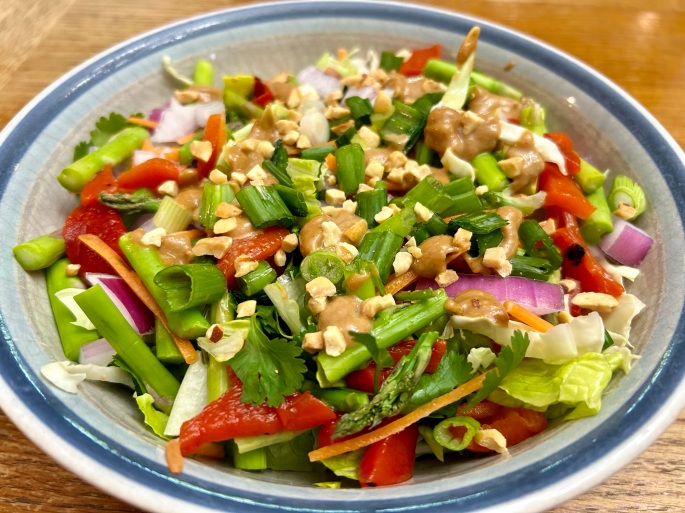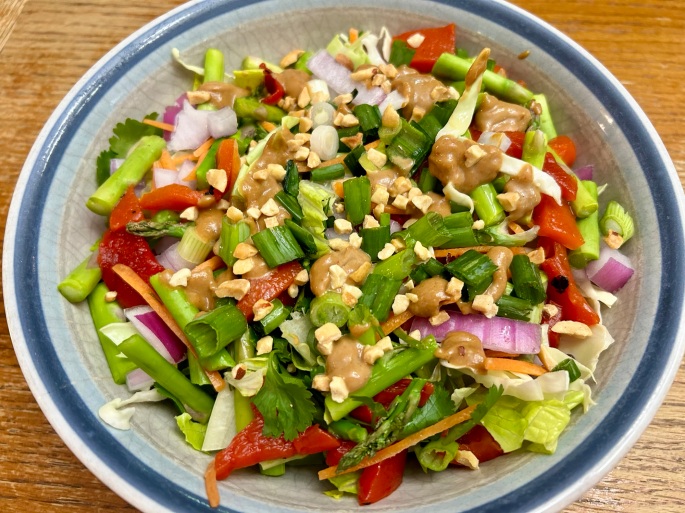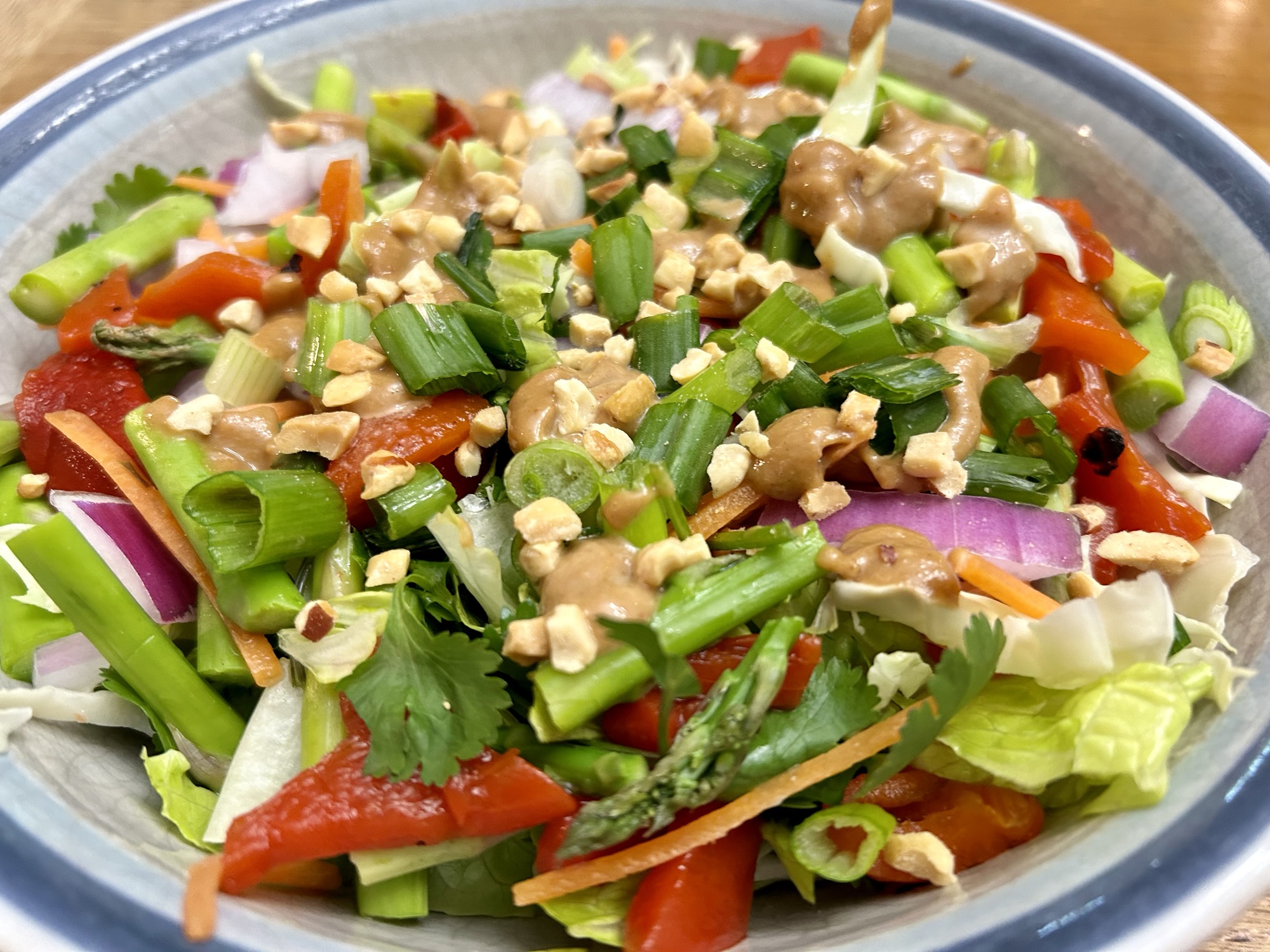with Tasty Thai-style Recipe to get you started
“A healthful, whole plant–based diet appears to yield the greatest risk reduction.”—The Journal of Alzheimer’s Disease (published December 2023)

The statistics of Dementia 🔢
According to the World Health Organization, over 55 million people globally suffer from some form of dementia, and approximately 10 million new cases are identified each year. Of these cases, 60-70% of them will be identified as having Alzheimer’s Disease. Additionally, women are most affected by dementia either directly or indirectly as a caregiver.
Family history and genetics are one obvious risk factor for dementia, but there are other contributing factors. These include: age, head injury, high blood pressure, high cholesterol, cardiovascular disease, diabetes, smoking, social isolation, stress, and excess alcohol intake. As a further consideration, recent research points to the fact that a person’s diet can either increase or decrease risk of developing AD, and this is exciting news, especially on a personal level.
Family History of Dementia 👵🏼 👴🏻
From a family lineage perspective, I am at high risk for developing some form of dementia, including Alzheimer’s Disease (AD). My maternal grandfather (and his mother) suffered from AD, and my paternal grandmother lived with a form of dementia in her final years. This is of great concern to me for obvious reasons, but especially for my daughter. She is an only child, and I do not wish for my final years to be such a heavy lift for her without the support of siblings.
Therefore, I try to stay up to date on the latest developments for prevention as well as treatments. While there are dozens of promising treatments for AD currently researched around the world, at the time of writing this piece, there is still no known medical treatment to slow or stop the progression of AD. It is considered fatal.

Dietary Habits can reduce or Increase Risk 🥦🍎🫛🍑
However, The Journal of Alzheimer’s Disease published, in December 2023, a comprehensive review of three decades worth of research that points to evidence that “dietary factors play important roles in the risk of AD.” This review reveals that the dietary practice of reducing meat consumption, and increasing whole, plant-based food decreases one’s risk for AD. Specific dietary approaches, such as MIND and DASH, appear to reduce one’s risk for AD 40-50%. However, the greatest reduction risk was found among those who did not include meat in their diet, and instead focused on whole grains, legumes, nuts/seeds, and plenty of fresh fruit and vegetables.

Lifestyle Habits that Reduce Risk of Dementia 🚶🚶🏽♀️
In addition to diet, there are other lifestyle habits that are also believed to reduce one’s risk for AD. These include:
- Not smoking
- Daily physical activity for approximately 30 minutes per day
- Maintaining a weight that is healthy for you
- Consistent quality sleep, 7-8 hours worth
- Social engagement
- Mental/cognitive engagement
- Limit alcohol consumption
- Protection of head and protection from falls

The Joy of a Plant-based Diet🍓🍆🫐🍠
Personally, I adopted a mostly whole food, plant-based diet nearly fifteen years ago for other health reasons. However, if eating this way also reduces my risk for AD, it is further motivation to continue.
One of my greatest discoveries about a whole food, plant-based diet is that there are so many tasty ways to prepare foods. I never feel deprived because my meals are full of an abundance of colorful, flavorful, and satiating foods. A great example is the dip recipe below. This peanut dressing/dip is beyond good! It is tasty on salads (as shared here), but it is also wonderful mixed into stir-fry as a sauce, drizzled over a bowl or pasta recipes, and it makes a savory dip worthy for a crudités platter for a holiday cookout or social gathering.

Customizable REcipe🥗
The recipes below can easily be modified to suit personal taste or dietary preferences. For example, the peanut butter can be replaced with almond, cashew, or sunflower seed butter if desired. The salad ingredients can be adapted too. Don’t like cabbage? Use all romaine. Not a fan of asparagus? Eliminate it. Rather use red onion over scallions? Go for it.
Anyway you prepare them, these recipes can be one tasty way to increase your consumption of healthful, whole, plant-based foods. Even if you are not willing to give up meat, research supports that consuming less meat and more plants will still provide some preventative measures against AD. Who knows? With the power of this type of research, you might even decide to try a few more recipes and incorporate even more plants into your diet! And the more you add, the more your body will benefit!
From my home to yours, here’s to your health, and especially preventing all forms of dementia to the degree possible!
Recipes inspired by: Three Little Chickpeas, This Healthy Kitchen, and Detoxinista
Peanut Dressing/Dip (Thai style) (gluten free)
Ingredients:
½ cup natural peanut butter
3 tablespoons tamari, liquid aminos, or soy sauce
2 tablespoons fresh lime juice
2 tablespoons maple syrup, honey, or agave
1 tablespoon rice wine vinegar
½ inch grated fresh ginger OR 1 ½ teaspoon ginger paste OR ¼ teaspoon ground ginger
1 teaspoon garlic powder
1 teaspoon onion powder
¼ teaspoon crushed red pepper or 2 teaspoon sriracha
3-5 tablespoons of water
Directions:
Either whisk together or use blender to blend all ingredients, gradually adding in water until reaching desired thickness, using less water for dip and more water for dressing
Thai-style Salad (gluten free)
1 heart romaine lettuce, roughly chopped
3 cups slaw mix OR red & green cabbage, roughly chopped
1 red pepper, chopped
3-4 green onions, chopped
½ cup shredded carrots
½ cup fresh cilantro
5-6 stalks asparagus, chopped, optional
½ cup chopped peanuts or cashews, optional
Directions:
In a large bowl, toss together chopped lettuce, cabbage, red pepper, and green onion with shredded carrots.
Heat asparagus in microwave for 30-40 seconds and toss into salad
Drizzle with desired amount of dressing and top with chopped peanuts or cashews, if extra crunch is desired.
Makes 2 large servings or 4 small servings.
Store leftovers dressing in the refrigerator for up to two weeks.


